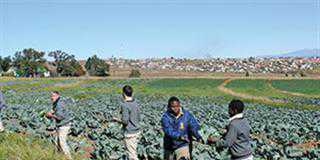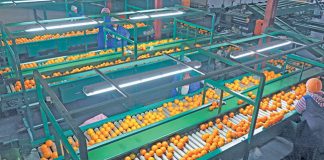<br /> <span style="font-style: italic">Ever-mounting anxiety about global warming is sparking consumer concerns, particularly in the UK, that carbon dioxide emitted while transporting food over long distances can contribute significantly to global warming. Wilma den Hartigh talks to experts about concerns over ‘food miles’.</span><br /> <br /> While some dismiss efforts to reduce so-called “food miles” as a storm in a teacup, others believe food miles could have a major impact on trade and exports. miles is a relatively new concept from countries such as the UK and Germany over food transportation. <br /> <br /> A study released by New Zealand’s Lincoln University last year on food miles and that country’s agriculture explains how the concept is becoming more important as consumers are increasingly concerned about the environment. What are food miles? <br /> <br /> The study defines food miles as “the number of miles or kilometres a product has to be transported from the farmer to various stages of production until it reaches the supermarket and finally the plate of the consumer”. <br /> <br /> Food mile lobbyists argue the longer the transport distance of a product, the more energy is consumed, more fossil fuel is burned and more greenhouse gases are released into the atmosphere to cause global warming. Lobbyists propose sourcing food from as close to where it will be consumed as possible. However, this study criticises the concept as very simplistic as it only considers the distance food travels, and not the total energy used in the production of the product. O lubukola Oyewumi, a senior trade economist at the National Agricultural Marketing Council in SA, agrees with these criticisms, particularly because production efficiency as measured by the amount of energy expended during production is not accounted for in the current calculations of food miles, which only takes care of distance. H e adds since data on energy requirements of direct and indirect production inputs are readily available, any accurate measurement of the environmental impact of food production and consumption ought to take those into account. <br /> <br /> <span style="font-weight: bold">Is it all hot air? </span><br /> Stefan Conradie, product manager of the South African Stone and Pome Fruit Organisation, cautions against dismissing the concept too hastily. “It is seriously debated in the UK. Marks & Spencer have announced they will indicate on their products if it has been air-freighted.” alks are also under way to determine acceptable levels of carbon usage per products. “In future, I expect that carbon levels generated to produce a product will be indicated on products,” Conradie says. n an article in the February/March issue of the SA Fruit Journal, Conradie says it is important to remember that UK consumers buy an attractive, healthy lifestyle, not necessarily the product. He says UK retailers have highlighted that production must take place in an ethical and environmentally friendly way. <br /> <br /> The situation regarding food miles must be monitored closely as it will impact on South African export to the UK in the future. “South Africa must be careful not to fall into a comfort zone regarding its current strong position in the UK market. South Africa must listen to what retailers and consumers are saying and adjust its supply strategy where necessary,” Conradie advises. Is this a non–tariff barrier? “Food miles is a very emotional discussion,” says Dr Dawie Ferreira, CEO of Capespan Logistics. With the World Trade Organisation freeing up global trade and duties, food miles could be interpreted as a protective measure for local producers. obias Doyer, CEO of the Agricultural Business Chamber, says the trend will not affect the way South Africans farm, but it is a competitive barrier. <br /> <br /> The UK doesn’t place limits on the amount of food miles, but local farmers do obtain better prices for their produce. “Consumers are overwhelmed with choice and producers must create any kind of competitive advantage.”<br /> A competitive advantage is necessary in these oversupplied and saturated traditional markets, Doyer stresses. “This is where China comes in because their markets are not so saturated, but high-end Chinese markets will also be interested in these issues.” <br /> <br /> Dr Ferreira doubts how well consumers really understand these concepts. “I’m not sure the general consumer is aware of all these issues.” He adds that the market for fair trade products don’t perform as well as expected. “Are these issues really at the top of the consumers’ minds when shopping?” he asks. But even if consumers are not really aware of these issues, exporters still cannot ignore them. Local versus imported products E rnst Klokow, general manager of Organics Africa, says the effects of road transport on global warming cannot be ignored. “Global warming is one of the drivers of this trend, and if gases are seen to contribute to global warming, consumers will see food miles in a serious light. But what about road transport? The impact here is far greater.”<br /> <br /> Doyer says that British farmers have claimed their products are superior because “closer is fresher”. They have placed emphasis on the origin of products as they are closer to their consumers and want to encourage support of the local economy and locally grown produce. He says producers distinguished themselves from others in this way. “All producers want to be competitive and get a premium price for their product,” Doyer stresses. Although British farmers claim “closer is fresher”, critics believe this is misleading. <br /> <br /> A recent article in The Economist states although it seems obvious to choose a locally grown product instead of an identical imported product, it may not actually result in the smallest possible environmental impact. The article quotes a report published by the UK Department for Environment, Food and Rural Affairs. The term “food mile” is misleading as a mile travelled by a large truck full of groceries is not the same as a mile travelled by a sport-utility vehicle carrying a bag of salad. Instead it is more helpful to think about food-vehicle miles (the number of miles travelled by vehicles carrying food) and food-ton miles, which take the amount being carried into account. Half the food-vehicle miles associated with British food are travelled by cars driving to and from the shops. Each trip is short, but there are millions of them every day. According to the article it would be more environmentally friendly to transport tomatoes by truck from Spain during the winter, than to grow them in heated greenhouses in Britain. Another finding was that there’s a shift towards local food systems, away from the supermarket-based food system with central distribution depots and big, full trucks. This shift could actually increase the number of food-vehicle miles travelled locally because more items would move around in a larger number of smaller, less efficiently packed vehicles. <br /> <br /> The Lincoln University report states because New Zealand has more efficient production systems, dairy, lamb and apples can be produced more efficiently there than in the UK, including transport costs. Onion production is more efficient in the UK than in New Zealand.<br /> <br /> The Kenya London News recently reported that a campaign in the European retail trade against airfreighted farm produce, designed to appeal to environmentalists who say aircraft pollute the atmosphere, will have a serious effect on poor countries’<br /> perishable exports, which must be carried by air to preserve freshness.<br /> <br /> According to this report, the UK’s top supermarket chain, Tesco, has decided to fly less than 1% of its produce, down from the present 2% to 3%, after the British Soil Association, an organic produce ratings group, said it was considering to refuse to certify airlifted imports. About 25% of Kenya’s exports are destined for the UK.
Is closer really better for the environment?
Ever-mounting anxiety about global warming is sparking consumer concerns, particularly in the UK, that carbon dioxide emitted while transporting food over long distances can contribute significantly to global warming. Wilma den Hartigh talks to experts about concerns over ‘food miles’.













